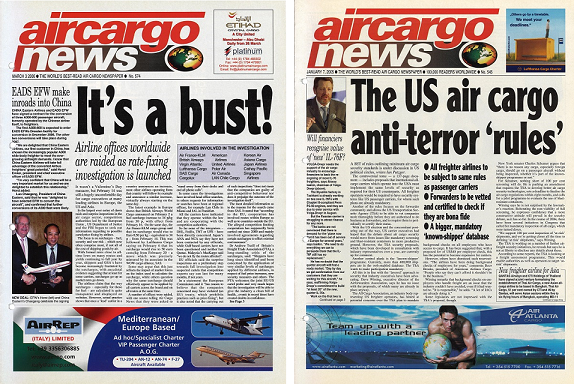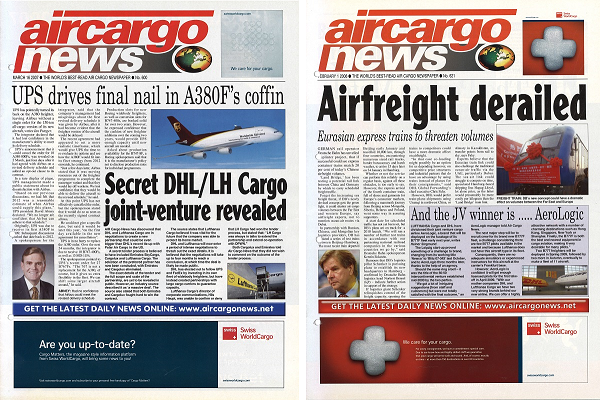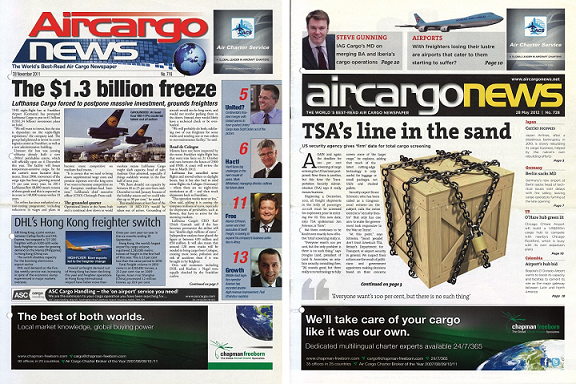2003-2012: Crisis management
02 / 08 / 2023

Political events and the realities of climate change drove more change in air cargo in the early years of the century. Meanwhile, news broke that competition authorities were investigating a price‑fixing scandal.
The 10-year period running from 2003 to 2012 was a testing time for the air cargo industry. It was buffeted by world events, but also generated its own controversies.
On the world stage, the industry was affected by the second Iraq war, a volcanic ash cloud, the global financial crisis, the regulatory fallout from 9/11 and terrorist bomb plots, and growing concerns about global warming.
The industry itself had the controversy of airlines and forwarders both facing cartel investigations and there were several game-changing acquisitions in forwarding and express spheres.
2003
The year started with news of capacity shortages for charter brokers as freighters were grounded in the US desert in response to a difficult economic environment following the September 11 attacks and the dot.com bubble bursting.
The weak demand environment also put carrier yields under pressure.
By February, attention had turned to the outbreak of war in Iraq as a US-led coalition invaded the country.
Air Cargo News (ACN) reported that the air cargo industry was on a war footing as charter firms braced themselves for a massive uplift of equipment and personnel.
In April, carriers later added a 10 cents a kilo war surcharge as the conflict continued.
Then in July, the difficult economic environment took its toll on Atlas Air as the freighter operator entered restructuring talks with creditors.
The company said airlines were returning ACMI aircraft in favour of ordering their own metal.
Elsewhere in 2003, booking platform GlobalFreight Exchange was reporting a surge in users, the Cargo 2000 programme – that benchmarked on-time performance – was gaining traction and United Airlines, which was at the time in Chapter 11 protection, announced that it planned to add freighters (plans quietly abandoned later on) and there was a push for adoption of RFID technology to aid cargo tracking.
2004
The year started with some good news for air cargo as demand showed signs of picking up after three years of decline.
Meanwhile, environmental performance was starting to make its mark on the pages of ACN, although at this stage the industry was quite wary – and even cynical – about demands to lower emissions,
“With environmentalists looking at ways to reduce the carbon dioxide emissions that are said to cause global warming, the air cargo industry awaits its punishment,” ACN reported.
The improved market conditions provided a fillip for Atlas Air as it managed to exit Chapter 11 protection after coming to an agreement with creditors. Meanwhile, a bankruptcy judge approved US freighter operator Arrow Air’s reorganisation plan, allowing it also to exit Chapter 11.
Acquisitions also began to pick up in 2004. First, express firm TNT entered the forwarding market through the purchase of Wilson Logistics in a deal worth about $308m. Then forwarder Exel purchased logistics firm Tibbett and Britten for $328m.
The biggest deal of the year came in October, when UPS announced the purchase of Menlo Worldwide Forwarding as express firms battled to become one-stop shops for transport services.
The year also saw the merger of Air France and KLM, a growing focus on efforts to move to electronic documentation and complaints of record fuel surcharges – more on that later. Boeing also confirmed plans for a 777 freighter and AirBridgeCargo entered the market.
2005
The fallout from the September 11 attacks continued in January 2005 as the US outlined plans for a new set of security standards requiring bellyhold cargo to be scanned.
Surcharges were back in focus in 2005 as forwarders complained about the array of extras being added to rates and sales agents were “hopping mad” as airlines refused to grant them commission on fuel and security surcharges.
On the M&A front, Deutsche Post in September announced the takeover of UK-based logistics group Exel in a deal worth about €5.3bn. The major acquisition turned DHL into the world’s leading airfreight and seafreight forwarder.
The growing importance of China as a manufacturing hub also saw FedEx launch the first direct express cargo flights from Europe, while it also announced plans to open a new hub in the country.
Likewise, UPS was looking to get in on the action through an agreement with Shanghai Airport.
There was also good news for Antonov Airlines after its fleet of AN-124s and its AN-225 were back in the air after being grounded for two years because of the threat of arrest as a result of a dispute between the Ukraine State Property Fund and TMR Energy.
Meanwhile, reports began to emerge that Baxter Global was being put up for sale by its owner and forwarder EGL was forced to deny speculation that its decision to axe 350 jobs was because it was preparing for sale.
The year also saw the launch of the Boeing 747-8 freighter with orders from Cargolux and Nippon Cargo Airlines.
2006
The biggest story of 2006 and possibly the decade – and something ACN would still be writing about even in 2023 – was the start of investigations into an air cargo cartel that involved fixing surcharges.
ACN reported that on February 14 dawn raids were conducted by competition authorities in the US, Asia and Europe.
Over the coming years, airlines were fined hundreds of millions of dollars, civil cases were launched and executives ended up in jail as the case rumbled on.
The year also saw Air Foyle and Air Foyle Heavylift cease trading when partner Antonov Airlines decided to team up with Volga-Dnepr to form Ruslan International.
The new joint venture would market 16 of the 24 AN-124 aircraft that were currently available to the market.
Elsewhere, Schenker took over BAX Global, Cathay Pacific bought Dragon Air and Panalpina discovered a $25.5m fraud carried out by one of its senior airfreight managers, which resulted in chief executive Bruno Sidler resigning from the role.
2007
Aircraft developments were making the headlines in the first part of 2007 when Airbus announced plans to launch the A330-200 freighter – although sales later disappointed.
Meanwhile, UPS cancelled its order for the A380F, which was the “final nail in the coffin” for the giant 150-tonne freighter as there were no further orders of the aircraft.
In March, ACN revealed that DHL was holding talks with Lufthansa over a possible joint-venture airline, which would eventually become AeroLogic.
The new 50/50 joint-venture freighter was eventually launched in 2009 with a fleet of 777 freighters.
The big takeover story of the year was EGL’s acquisition by Apollo. It was then merged with Apollo’s existing logistics business, CEVA.
The takeover was an acrimonious affair as an investor group led by EGL chief executive Jim Crane had previously agreed on a deal with the owners.
But that arrangement was later ripped up in favour of Apollo’s higher bid.
In October, forwarders were hit by “shock raids” as European and US agents stormed offices in a new antitrust cartel investigation.

The forwarders were accused of fixing surcharges and the fallout, like that of the airlines, would drag on for years to come.
The year was a difficult one for Kitty Hawk, the largest pure all-cargo operator in the US, as it filed for Chapter 11 protection. The company blamed a shift from air to road and eventually folded in 2008.
In addition, DAS Air Cargo’s operations were suspended – and its assets sold – towards the end of the year as it faced the financial fallout from a temporary ban on its DC-10s on safety grounds.
2008
This year saw plenty of developments on the airline cargo cartel case. First, in January the European Commission announced the start of formal charges against 25 airlines. Next came the news that civil action was being launched and executives at Qantas, SAS and British Airways were given jail sentences.
There was also controversy at Deutsche Post as chief executive Klaus Zumwinkel was accused of tax evasion. ACN reported that Zumwinkel stepped down from his role to be replaced by Frank Appel.
Early in the year, ACN also reported on the threat of the start of rail services between Asia and Europe under the headline “Airfreight derailed”. Deutsche Bahn reckoned rail could take 20% of air volumes on the trade.
In terms of business, it was a tough year for air cargo as the impact of the global financial crisis hit air cargo demand.
By the end of the year, Emirates SkyCargo’s Ram Menen said the bottom of the air cargo market had caved in: “We are not just scraping the bottom, but chipping at the rock,” he said.
Other top stories from the year included the merger of the Delta Air Lines and NWA fleets, which would eventually see NWA’s freighter operations wound up. MK Airlines faced financial difficulties, Jim Crane re-entered forwarding with Crane Worldwide and AirFrance KLM announced plans to roll surcharges into the rate.
2009
The impact of the global financial crisis continued to affect air cargo in 2009, with volume declines eventually bottoming out in April at a rate of 22.1%.
In August, ACN reported that yields had hit rock bottom: “Stop the suicidal rates war now” read one front cover as carriers were reportedly offering zero rates on some markets.
A few weeks later, Lufthansa Cargo wrote to its customers to tell them rates would go up by 25% as it warned that if prices continued at their current level, most of the world’s freighter fleet would need to be grounded.
However, by the end of the year, demand had returned as inventories needed restocking and capacity shortages were reported on services out of Asia.
The year also saw the demise of Belgian all-cargo carrier Cargo B in July as it struggled with falling demand and prices on its African and South American services.
A few weeks later there was the long-awaited launch of Air Cargo Germany as it finally obtained its AOC. 2007 also saw the launch of SF Airlines, which has since risen to become the largest freighter operator in China.
2010
Safety and security regulations took on a renewed importance at the start of the new decade.
In January, ACN reported that the air cargo industry was preparing for a US requirement that 100% of belly cargo should be screened from August 3.
However, by March the US Transportation Security Administration confirmed that the deadline would be missed.
Later in the year, a UPS Boeing 747-400 crashed, with lithium batteries thought to have started a fire on the aircraft. The incident sparked discussion on the need for stricter rules around the transportation of the batteries.
In November, two bomb plots were foiled as terrorists targeted UPS and FedEx freighters. The incidents brought even closer focus on air cargo security.
The year also saw the Icelandic ash cloud cause massive flight cancellations for six days in April.
Once aircraft were back in the skies, shippers complained of sky-high rates as the industry played catch-up.
Elsewhere in 2010, Japan Airlines exited freighter operations, Arrow Air Cargo and MK Airlines both went under as market conditions took their toll, and there were ongoing complaints from forwarders about increases in security surcharges.
2011
Security regulations were back on the agenda in 2011 as the US brought forward its screening requirement to December 31, 2011, after it was knocked back a couple of years in 2010.
The move was in response to the freighter bomb plots. However, there was another U-turn and the date was again moved back.
The other big news from 2011 was the introduction in November of a night flight ban at Frankfurt Airport running from 23:00hrs to 05:00hrs.
The ban prompted Lufthansa Cargo to freeze its €1bn investment plans for a new cargo centre and administrative buildings.
Elsewhere, IAG Cargo was formed following the merger between British Airways and Iberia, Cathay Pacific, and Air China launched joint venture Air China Cargo and there were fears that Dutch booking portal Aircargoshop could cut out freight forwarders by offering discounts to shippers.

American Airlines also filed for Chapter 11 bankruptcy protection.
It was also a big year for ACN, as the publication was bought from Air Cargo Media by German publisher DVV Media. The purchase saw Ray Crane leave the publication he founded in 1983 while Nigel Tomkins returned as editor.
2012
The European Union brought in stricter security requirements in February as airlines flying cargo from a third country were required to have specific approval.
Also, in February, Lufthansa Cargo announced that it would quit its 25% shareholding in Jade Cargo as the carrier stopped flying because of weak market conditions.
Recently launched Air Cargo Germany found itself in trouble after two years of losses but Volga-Dnepr Group then purchased a 49% stake in the airline.
And mounting debts resulted in US freighter operator Southern Air slipping into Chapter 11 protection, which it later exited.
Sustainable Aviation Fuel (SAF) had its first mention in ACN in July as an ICAO initiative to test the fuel was launched.
Plus, paperless cargo was again making the headlines in 2012 as the electronic air waybill came into focus. Forwarders and airlines were blaming each other for the lack of progress while IATA set the target of 20% penetration of the e-AWB by the end of 2013 and 100% by 2015 – targets that were inevitably missed.
The end of 2012 saw the US finally implement its bellyhold screening requirements without too many issues being reported by ACN.














